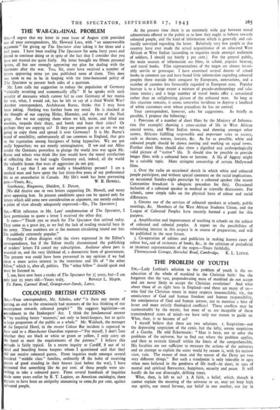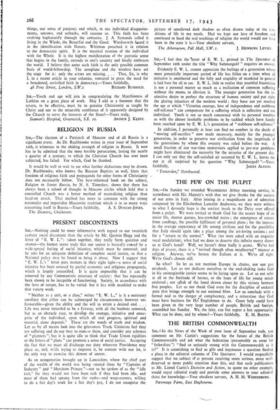THE PROBLEM OF YOUTH
Six,—Lady Lothian's solution to the problem of youth is the re- education of the whole of mankind in the Christian faith: has she forgotten that the vast, preponderating mass of mankind do not accept and are never likely to accept the Christian revelation? And what about those of us right here in England—and there are many of us— who find the Christian tenets in many respects irreconcilable, viz., the• omniscience of God and human freedom and human responsibility, the omnipotence of God and human sorrow, not to mention a hOst of lesser and more strictly theological conflicts? These conflicts may be surmountable' by the mystic, but most of us are incapable of these transcendental states of mind—we have only our reason to guide us. What, then, is to become of us?
I myself believe that there are two solutions. r. Scepticism—not the depressing scepticism of the cynic, but the lofty, serene scepticism of a Goethe. He told Eckerinann: " Man is born, not to solve the problems of the universe, but to find out where the problem applies, and then to restrain himself within the limits of the comprehensible. His faculties are not sufficient to measure the actions of the universe; and an attempt to explain the outer world, by reason is, with his narrow view, vain. The reason of man and the reason of the Deity are two very different things." But such a standpoint is only tolerable in ages when men believed in the goodness of life itself—in short, in ages of mental and spiritual florescence, happiness, security and peace. It will hardly do for our distraught, drifting times.
What, then, is left to us? 2. A faith, a belief, which, though it cannot explain the meaning of the universe to us, may yet keep high our spirits, our moral fervour, our belief in one another, our joy in
things, our sense of purpose; and which, in our individual disappoint- ments, sorrows, and setbacks, will succour us. This faith has been evolving haphazardly through the centuries. J. A. Symonds called it living in the Whole, the Beautiful and the Good. Wordsworth found it in the identification with Nature. W hitman preached it in relation to• the democratic spirit. It is the mystical reunion of the individual with the Whole. It is the highest manifestation of the patriotic sense that begins in the family, extends to one's country and finally embraces the world. I believe that some such faith is the only possible common basis of world-fellowship. The aeroplane and the wireless have set the stage for it: only the actors are missing. . . . That, Sir, is why I, in a recent article in your columns, ventured to press the need for a broadened, revivified faith in democracy.—Yours faithfully,



























 Previous page
Previous page